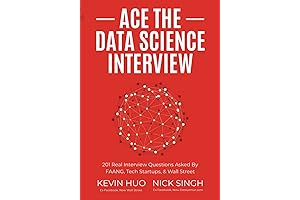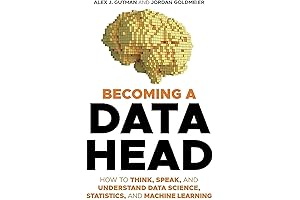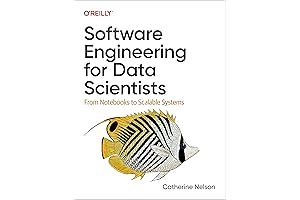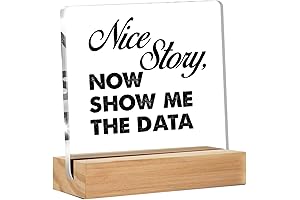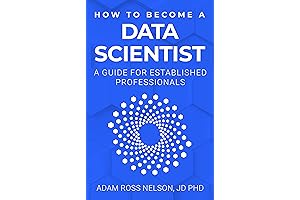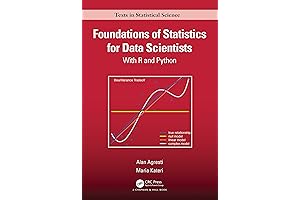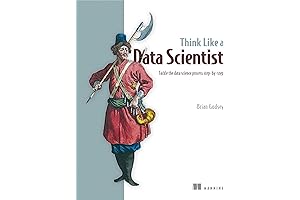· data science · 14 min read
Best Data Science Learning Materials To Shape Your Career In 2024
A compendium of the best data science learning materials to boost your career in 2024.
In an era where data has become an indispensable asset, the demand for skilled data scientists has witnessed an unprecedented surge. Whether you are an aspiring or experienced data scientist, continuous learning is paramount to staying ahead in this rapidly evolving field. This article presents a curated selection of highly acclaimed learning resources that will guide you in mastering the concepts, techniques, and tools of data science. These materials are carefully chosen to empower individuals at various stages of their data science journey, from beginners to seasoned professionals.
Overview

PROS
- Provides a comprehensive list of 201 real-world interview questions covering the entire spectrum of data science concepts.
- Expertly curated by seasoned professionals from top tech companies and Wall Street, ensuring relevance and authenticity.
- Empowers candidates with in-depth explanations, insightful tips, and actionable strategies to tackle even the most challenging questions.
CONS
- May require additional practice and preparation to fully grasp the concepts discussed.
- The volume of questions can be overwhelming for some readers.
Sharpen your data science interview skills with the ultimate weapon: 'Ace the Data Science Interview.' This comprehensive guide unveils the secrets behind 201 real interview questions posed by industry giants like FAANG, tech startups, and Wall Street. Embark on a journey of interview preparation, where you'll discover:
A thorough dissection of essential data science concepts, empowering you to navigate complex questions with confidence. Inside, you'll find expert insights, proven techniques, and practical examples to help you dominate technical and behavioral challenges alike. Elevate your preparation with 'Ace the Data Science Interview,' the essential resource for unlocking your career potential in the dynamic world of data science.

PROS
- Comprehensive coverage of essential statistical concepts for data scientists
- Clear and concise explanations using both R and Python code examples
- Real-world case studies and exercises to reinforce learning
CONS
- Some advanced topics may require additional resources for deeper understanding
- Assumes prior knowledge of basic programming and statistics
For aspiring data scientists, 'Practical Statistics for Data Scientists' serves as an invaluable guide, offering a comprehensive exploration of over 50 essential statistical concepts. The book's strength lies in its balanced approach, seamlessly integrating intuitive explanations with practical code examples in both R and Python. Through real-world case studies and hands-on exercises, it effectively reinforces learning and prepares readers to tackle real-world data analysis challenges.
While the book covers a wide range of topics, it is essential to note that some advanced statistical techniques may require additional research for a more thorough understanding. Additionally, prior exposure to basic programming and statistics will enhance the learning experience. Overall, this book is highly recommended for data scientists seeking to enhance their statistical knowledge and practical skills.

PROS
- Provides a comprehensive overview of data science, statistics, and machine learning, making them accessible to both beginners and experienced professionals.
- Effectively demystifies complex concepts through relatable analogies and real-world examples, empowering readers to develop a solid understanding of the field.
CONS
- Some readers may find the writing style informal and conversational which may not appeal to everyone.
- The book primarily focuses on conceptual understanding and may lack in-depth technical details for advanced practitioners.
As a data scientist, 'Becoming a Data Head' proved invaluable in deepening my understanding of data concepts. From data acquisition to visualization and analysis, the book expertly guides readers through the complexities of the field. Whether you're just starting out or seeking to enhance your knowledge, this book will equip you with the tools to think, speak, and understand the language of data effortlessly.
Throughout the book, the author effortlessly demystifies intimidating topics, making them relatable and applicable in real-world scenarios. The inclusion of case studies and examples further reinforces the learning, ensuring a comprehensive and practical understanding of data science, statistics, and machine learning. This book is not only a valuable resource but also an empowering tool for anyone seeking to elevate their data fluency in today's data-driven world.

PROS
- Connects data scientists to the power of SQL for data manipulation and analysis
- Presents a systematic approach to building datasets tailored for data analytics
CONS
- Assumes some prior programming knowledge, which may limit accessibility for complete beginners
Harness the power of SQL for data scientists with this beginner-friendly guide. Delving into the intricacies of data manipulation and analysis, it equips you with the tools to build robust datasets that fuel your data-driven insights.
Structured and comprehensive, this guide leads you through the essential concepts of SQL, empowering you to extract meaningful patterns and relationships from complex data. Whether you're new to SQL or seeking to refine your skills, this resource will elevate your data science capabilities.

PROS
- Comprehensive guide for data scientists to master software engineering principles
- Covers essential topics like designing scalable systems, managing code complexity, and infrastructure optimization
CONS
- May be too advanced for beginners in software engineering
- Some readers might find the emphasis on Google Cloud Platform-specific tools limiting
Unlock the full potential of your data science skills with 'Software Engineering for Data Scientists: From Notebooks to Scalable Systems'. This invaluable guide bridges the gap between data science and software engineering, empowering you to build robust, maintainable, and scalable systems for your data-driven projects.
Starting with the fundamentals of software engineering, the book progressively delves into advanced concepts like system design, code management, and cloud infrastructure. The author's practical insights and real-world examples make this book highly applicable for data scientists looking to elevate their technical abilities. Whether you're a seasoned data scientist looking to expand your knowledge or a software engineer transitioning to data science, this book will provide you with the essential tools to succeed in your endeavors.

PROS
- Compact 4 x 4-inch size, perfect for desks and cubicles
- Durable acrylic construction ensures longevity and clarity
- Vibrant colors and eye-catching design add a touch of style to any office
- Inspirational message empowers and motivates data scientists
CONS
- May not be suitable for larger workspaces that require a more prominent sign
- Customization options are limited
This exquisite acrylic sign is a must-have for any data scientist who takes pride in their craft. Its compact size makes it an ideal addition to desks and cubicles, while its durable acrylic construction ensures it will withstand the rigors of daily use. The vibrant colors and eye-catching design add a touch of style to any office, making it both a functional and aesthetically pleasing piece.
Beyond its visual appeal, the sign carries an inspirational message that resonates with data scientists. Its declaration of 'Keep Calm and Analyze Data' serves as a constant reminder of the importance of maintaining composure and applying analytical thinking to complex problems. This sign is not merely a decoration; it is a testament to the dedication and passion that drives data scientists to uncover insights and make informed decisions.

PROS
- Comprehensive guidance for seasoned professionals seeking a transition to data science
- Real-world case studies and practical examples to enhance understanding
CONS
- May not be suitable for complete beginners in the field
- Assumes prior knowledge in related domains
This comprehensive guide empowers established professionals with the knowledge and strategies to navigate the transition into the burgeoning field of data science. It adeptly combines theoretical foundations with practical insights, drawing upon real-world case studies to solidify understanding. While it caters primarily to those with a background in related disciplines, its well-structured approach and accessible language make it an invaluable resource for aspiring data scientists.
The guide excels in its meticulously crafted curriculum, meticulously designed to equip readers with the requisite skills and knowledge. It delves into essential topics such as data analysis, machine learning algorithms, and data visualization techniques. Each chapter is enriched with hands-on exercises and thought-provoking questions, fostering a deep comprehension of the subject matter.

PROS
- Provides a comprehensive foundation in Python programming for data scientists.
- Covers essential machine learning concepts and algorithms, making them accessible to beginners.
- Features hands-on exercises and real-world examples to reinforce learning and practical application.
- Empowers data scientists with the skills to harness the power of Python and machine learning.
- Serves as a valuable resource for both aspiring and experienced data scientists seeking to advance their knowledge.
CONS
- May require some prior programming experience for optimal comprehension.
- Assumes a basic understanding of mathematics and statistics concepts.
Delve into the world of data science and machine learning with this comprehensive guide, tailored specifically for data scientists. This book provides a solid foundation in Python programming, the essential language for data science and machine learning. You'll gain a deep understanding of core machine learning concepts such as supervised and unsupervised learning, feature engineering, and model evaluation. Through hands-on exercises and real-world examples, you'll apply your knowledge to practical scenarios, solidifying your understanding and equipping you to tackle real-world data science challenges.
Written by experienced data scientists, this book is designed to empower you with the skills and knowledge necessary to harness the power of Python and machine learning. Whether you're just starting your data science journey or looking to advance your existing skills, this guide will serve as an invaluable resource, guiding you towards mastery in the field.

PROS
- Comprehensive coverage of statistical concepts essential for data scientists
- Clear and accessible explanations with real-world examples
- Hands-on exercises and code snippets in both R and Python
- In-depth treatment of advanced topics like Bayesian inference and machine learning
CONS
- May be too advanced for beginners in statistics
- Some sections could benefit from more detailed examples
Foundations of Statistics for Data Scientists is a comprehensive guide to the statistical concepts and techniques that underpin the field of data science. Written by experienced data scientists, this book provides a solid foundation in the fundamentals of statistics, including probability theory, hypothesis testing, regression analysis, and Bayesian inference. It also covers more advanced topics such as machine learning and deep learning.
The book is well-written and easy to follow, with clear explanations and numerous examples. It is also up-to-date with the latest developments in data science, including the increasing use of open-source software such as R and Python. The exercises and code snippets in the book are a great way to put your learning into practice.

PROS
- Provides a comprehensive overview of the data science process, breaking it down into manageable steps.
- Offers practical examples and real-world case studies to illustrate concepts.
CONS
- May not be suitable for experienced data scientists looking for advanced techniques.
- Some readers may find the pace to be a bit slow.
Think Like a Data Scientist: Tackle the data science process step-by-step is an essential resource for aspiring data scientists who want to master the fundamentals and develop a solid foundation in the field. This book offers a comprehensive and practical approach to the data science process, guiding readers through each step in a clear and accessible manner.
What sets this book apart is its focus on real-world applications. Author Brian Godsey complements theoretical concepts with practical examples and case studies, helping readers understand how these techniques are used to solve real-world problems. By exploring case studies in healthcare, finance, and marketing, readers get a glimpse into the practical applications of data science across various industries.
This comprehensive article offers an extensive overview of the most valuable data science learning resources available in 2024. From foundational books to practical guides, online courses to certification programs, we have meticulously selected materials that cater to diverse learning styles and skill levels. The curated book recommendations provide a solid theoretical foundation, while online courses offer interactive learning experiences. For those seeking industry-recognized credentials, certification programs serve as a testament to one's proficiency in data science. Additionally, we have included supplemental resources such as blogs, forums, and communities that foster knowledge sharing and professional networking. With this meticulously compiled list, you can embark on your data science learning journey with confidence, knowing that you have access to the best resources in the field.
Frequently Asked Questions
What are the most comprehensive data science books available?
For a comprehensive grounding in data science fundamentals, consider 'Practical Statistics for Data Scientists' and 'Foundations of Statistics for Data Scientists.' To delve into advanced topics, 'Software Engineering for Data Scientists' and 'Think Like a Data Scientist' are invaluable resources.
What are the benefits of enrolling in online data science courses?
Online courses provide flexibility, allowing you to learn at your own pace and schedule. They often include interactive exercises, quizzes, and projects that reinforce your understanding of data science concepts. Additionally, many platforms offer certificates of completion, which can enhance your resume and demonstrate your commitment to professional development.
How can certification programs advance my data science career?
Industry-recognized certification programs validate your data science skills and knowledge. Earning these certifications demonstrates your proficiency to potential employers and clients, showcasing your expertise in specific areas of data science. They can also open doors to new career opportunities and higher earning potential.
How do blogs and online forums contribute to data science learning?
Blogs and online forums are vibrant communities where data science professionals share their knowledge, insights, and experiences. They provide a platform for asking questions, discussing best practices, and staying up-to-date on the latest trends and technologies in the field. Active participation in these communities fosters a sense of belonging and contributes to your professional growth.
What sets this article apart as a valuable resource for data science learning?
This article stands out as a valuable resource for data science learning due to its comprehensive and curated nature. It presents a diverse range of materials, catering to learners at various stages of their data science journey. The recommendations are carefully selected based on their quality, relevance, and effectiveness in imparting data science knowledge and skills. By leveraging the resources outlined in this article, you gain access to a wealth of valuable information from industry experts and experienced practitioners, empowering you to make informed decisions about your data science learning path.
